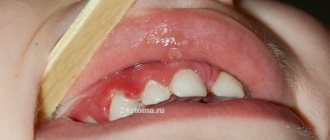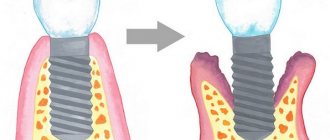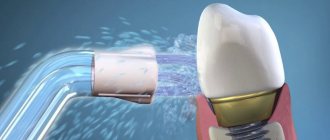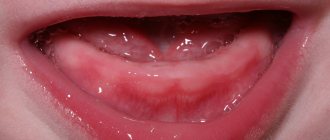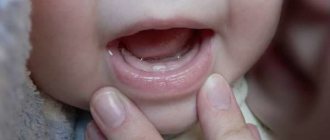The phrase “the baby is teething” is associated with many feelings and emotions of both the parents themselves and the main character. There is awe at the new stage of development (and toothless childhood is over!), joy for the baby’s growing up, and anticipation for the next period of life (the introduction of complementary foods). But also, anxiety for the child’s physical and emotional state does not leave the parent’s heart, because unpleasant sensations in the oral cavity negatively affect the child’s mood and behavior. Everyone begins to suffer: the baby cries, the mother is worried, the father is nervous, the grandmother calls endlessly with new popular advice. Peaceful sleep temporarily (!) leaves the father's house.
It is important to distinguish worsening sleep caused by the eruption of a new tooth from poor sleep in general. Sometimes such unpleasant symptoms as frequent awakenings at night and capricious mood are caused by an incorrect regimen, incorrect associations and non-compliance with the rules of the organization of the day.
Let's try to figure out when worsening sleep is actually caused by the onset of a rather painful process.
Symptoms of teething in a baby:
- ♦The gums are red/white and swollen;
- ♦Salivation has clearly increased;
- ♦Redness/rash appeared around the mouth (due to a large amount of saliva);
- ♦The baby pulls into his mouth and bites all kinds of objects (rattles, pens, daddy’s glasses);
- ♦A runny nose may appear;
- ♦Slight dilution of stool (again due to increased salivation);
- ♦Appetite may worsen (due to pain in the mouth);
- ♦And also the baby has become noticeably more capricious, his sleep is more restless, his mother’s warmth and care are more needed (“hangs in his arms”).
It is important to remember that this period is temporary and will end. Be patient, gather your willpower and try to help your child survive this process. The mother’s actions to permanently return the former dream to the family are the same as during the child’s illness.
And now the important information. Key, I would say! Attention!
Sleep and teething - what to do?
All parents know that teething is one of the most unpleasant events that can happen to their baby. Children become capricious, sleep poorly and put everything in their mouth. But parents often confuse poor sleep and the vagaries associated with it with teething. How to understand that your baby is teething and how to maintain good sleep?
Some sleep experts write in their books that teething does not harm sleep if the baby has already formed the right habits. But I can't agree with this. As with everything else, all children are different, and their pain sensitivity threshold is different. So I think it's our responsibility as parents to sympathize and try to help kids get through this difficult period, but at the same time make sure they get enough sleep.
What are the signs that your baby is teething?
- excessive salivation;
- runny nose;
- redness of the cheeks and/or rash on the chin, around the mouth;
- refusal of the breast/bottle or, conversely, the desire to breastfeed more often;
- strengthening of the sucking reflex;
- desire to bite/gnaw everything around;
- swollen, whitish gums;
- difficulty falling asleep and staying asleep;
- capriciousness, tearfulness.
Also, sometimes when teething, the temperature may rise, stool and frequency of urination may change. But if these symptoms occur, you need to be more careful, as they may indicate an infection. Therefore, if you have any suspicions, it is better to consult a doctor.
How to distinguish teething from just bad sleep?
In fact, this is a very difficult question. My baby, for example, never had swollen gums, fever or runny nose, and the desire to put everything in his mouth did not depend on teething. I usually discovered new teeth by accident. That is, just yesterday evening the gum looked as usual, but today a tooth is sticking out of it. How can you differentiate poor sleep due to teething from other causes of poor sleep? Here are the main points that parents need to remember:
1) The baby slept well, but now he sleeps very poorly. If you have ruled out all possible reasons for waking up and the baby is not sick, then it may be that his teeth have begun to bother him. If this is the case, look closely and you may be able to spot one or more of the symptoms listed above.
2) The baby feels unwell throughout the day. The discomfort from teething should not be confused with the evening whims that arise due to insufficient sleep during the day or going to bed late at night. Indeed, the baby may be more restless at night. But if he behaves very well during the day, and often wakes up at night, then the cause may not only be his teeth.
3) If you have ruled out all other causes of your baby’s anxiety, then you can give him a painkiller 15-20 minutes before bedtime (for example, Nurofen - 2.5 ml once), having previously discussed this with your pediatrician. If the baby is really worried about his teeth, then he will fall asleep better and will not wake up for at least 4 hours, or even all 5-6 (if at night), and during the day he will have a full sleep lasting 1.5-2 hours.
How long does teething take?
It can take 2 years from the first to the last tooth. But this does not mean that the baby will sleep poorly for the entire 2 years “because of teeth.” Very often, parents attribute poor sleep to teething. But in reality, teething itself lasts 2-5 days (molar teeth take longer to erupt). The rest of the poor sleep time is the result of bad habits that we, parents, unknowingly create.
How to help your baby?
Even though it is very difficult to relieve a baby's distress, we still need to make every effort to help him fall asleep and get enough sleep throughout the day and night.
Throughout the day, various teethers (pre-chilled in the refrigerator), a pacifier, special massage brushes, additional drinking of cool water, and additional breastfeeding can help. Teethers helped my baby, but I know many mothers who said that it didn’t help them at all. Try to experiment, and perhaps you will find something that suits your baby.
Nonsteroidal anti-inflammatory drugs (ibuprofen or paracetamol) are considered the most effective medications. Children's ibuprofen (=nurofen) is considered the gold standard, but some experts do not recommend it before 6 months. Therefore, before giving your baby one of these drugs, consult your pediatrician .
Freezing gels can also help. But they must be used very carefully, as they can have a fairly strong “freezing” effect, which can greatly frighten the child and he may become even more restless. Note! According to the latest data, it is not recommended to use pain-relieving gels that contain benzocaine (for example, Orajel), as they can be dangerous to your baby's health. (More about this here.)
Separately, I would like to say about homeopathic medicines. As is known, their effectiveness has not been proven. But the harm has also not been proven. Although mothers claim that their baby “helped a lot.”
Should I stop sleep training during teething?
There can be no clear answer here. If the baby is very unwell, his temperature has risen and he refuses to eat, you should pay him even more attention, take him in your arms, hug him, stay with him longer, even if this affects his sleep. But if the baby is simply “gnawing on his fists,” then you should not deviate from the planned plan. As I already wrote above, teeth erupt over the course of 2 years, but this does not mean that you need to suffer all these 2 years and wait for them to all erupt.
Natalya Domres, children's sleep consultant, neurologist and author of the Baby's Sleep project
Dear Parents! I sincerely wish your babies healthy teeth and good sleep. If you need help, you can always contact me for a consultation, and together we will help you and your baby get enough sleep!
Do you want to keep abreast of new articles and events of the Baby's Dream project? Sign up for the newsletter on the right side of the page!
How to distinguish teething from bad sleep in principle?
Let's be honest with ourselves and check the following points:
- ♦You monitor your child’s routine: avoid over-excitement, overstimulation before bed, and maintain sleep hygiene. But the dream suddenly deteriorated for no apparent reason;
- ♦The baby feels unwell throughout the day, and not just when trying to put him to sleep and at night;
- ♦Time passes, but the situation does not change. We remember! Teething lasts 2-5 days. (An exception may be molars). I repeat: 2-5 days. Not a month, not six months!
Therefore, if your pediatrician reassures you that your whole family has not been sleeping for two months now because of a tooth, it makes sense to think about replacing it. And a reason to contact our Children's Sleep Center for help from a sleep consultant
Vera Borisovets Senior supervisor
Psycho-emotional discomfort
The first factor from this group is significant changes in the child’s life: moving, joining the family, starting “kindergarten” life. The child is worried, worried and sleeps poorly.
How to proceed:
- don't scold;
- devote enough time during the day;
- discuss the baby’s feelings and emotions;
- gently soothe;
- pay attention to the positive aspects of change.
The second factor is stress: a quarrel with a friend, a fight with a peer, scandals in the family, divorce of parents. The baby replays the situation in his head over and over again, blames himself for everything, and sleeps little and restlessly.
How to proceed:
- talk to your child more often, tell him that you love him;
- consider the problem from different angles;
- explain the actions of other people;
- Do not allow the baby to be present when adults quarrel.
The third factor is fears. They are varied, occur in children at the age of 2-3 and can disturb a child’s sleep for a long time, preventing him from falling asleep, and then exhausting him with nightmares.
How to proceed:
- if fears arise in a 2-year-old child due to the cancellation of co-sleeping with his mother, extend this period a little;
- create calming bedtime rituals - a warm, relaxing bath, a good bedtime story from dad or a lullaby from mom;
- get an object intermediary - a teddy bear or a bunny that you can hug in your sleep and no longer be afraid of;
- do not insist on complete darkness - turn on a small night light.
The fourth factor is congenital increased excitability. Such children are anxious, restless, and have difficulty parting with their mother.
How to proceed:
- if possible, organize co-sleeping in the first year or two of life;
- do not scold or shame;
- before going to bed, prefer very quiet activities and have a relaxing massage;
- when waking up at night, make him feel that the baby is safe - pat him on the arm or back, calm him down in a quiet voice.
Causes of night toothache
To find out why teeth hurt at night but not during the day, you need to know the main factors contributing to the occurrence of this disease. Practicing medical professionals identify the following main reasons:
- Violation of the integrity of the tooth crown.
- Painful reaction to a decrease or increase in temperature (occurrence of caries).
- Severe swelling of the gums and, as a result, an increase in body temperature (flux).
- Persistent pain in the upper jaw (sinusitis).
- Acute toothache radiating to the temporal region (pulpitis, wisdom tooth periodontitis).
- Various dental injuries.
- Inflammatory processes of the middle ear.
- The appearance of acute purulent processes in the jaw.
Aching toothache at night feels more painful than during the daytime. This factor is explained by physiological and psychological manifestations. The first are associated with strengthening or weakening the functioning of organs directly related to the condition of the teeth. The developing swelling compresses the nerve approaching it. This sharply increases the pressure in the internal part. And as a result, severe pain appears.
By morning they may weaken or disappear altogether. Experts associate this with the functioning of the adrenal glands. These organs are responsible for stopping the development of inflammatory processes. In the morning hours they are especially active and efficient. Thanks to their positive effects, painful phenomena do not appear so strongly. In the evening and at night, special hormones that suppress pain processes are not released. A person experiences persistent sensations that cause general harm to health.
During the daytime, a person is busy almost the entire period. He is surrounded by everyday hassles and problems, whether he is working or studying. He has no time to think about the present toothache. Even if it is activated, it does not cause unpleasant consequences against the backdrop of a busy daytime.
At night, especially before five o’clock in the morning, the body is in a completely relaxed and unprotected state. The reaction to any, even the most minor, pain and inflammation increases. A person perceives any influence very sensitively. Accordingly, toothache intensifies at night.
What first aid should be given for night toothache?
How can you relieve toothache at night if it does not subside? Dentists recommend immediately taking certain actions:
- Taking fast-acting painkillers.
- Rinsing the mouth with herbal compositions.
- Use of traditional folk remedies.
The first method means the effective use of the most common drugs. You should always have a sufficient quantity of Analgin, Pentalgin, and Aspirin tablets in your home medicine cabinet. Paracetamol. These products are affordable and have a quick positive effect. For young patients suffering from night toothache, it is recommended to use Ibuprofen or its analogues.
It is recommended to soften solid preparations to a powder state. Place a small amount on the affected area. And try to leave the tooth with the applied medication for at least half an hour.
Tooth pain at night is excellently eliminated with various herbal formulations. Mint, lemon balm, sage, oak bark, calendula, and chamomile perfectly soothe aching pain. It is recommended to prepare a solution yourself from dried herbs and flowers or use a ready-made tincture. Several mouth rinses will help soothe pain and stop its further development.
Many folk tips also help with toothache at night. They have been tested by centuries of practice and always provide effective assistance.
A true and proven method is to place a piece of salted lard on the sore part of the gum. This is a completely harmless, and also edible, method.
A cotton ball soaked in alcohol acts as an anesthetic on the aching tooth.
Applying ice to the outside of your cheek can help dull annoying nighttime pain symptoms.
A warm aqueous solution of table salt has an excellent effect on an inflamed tooth.


